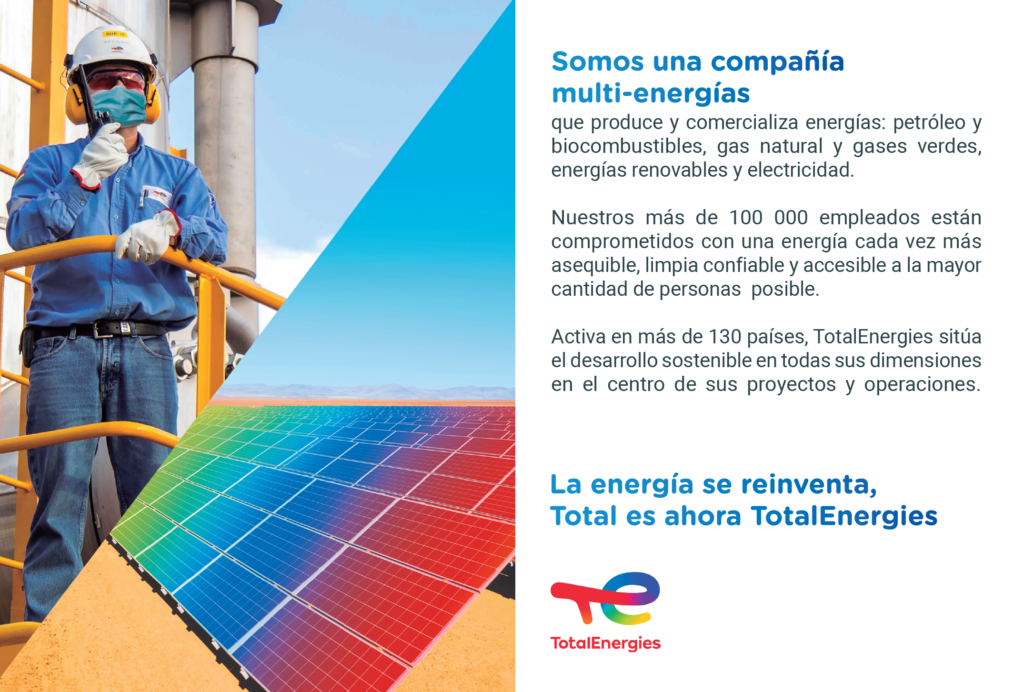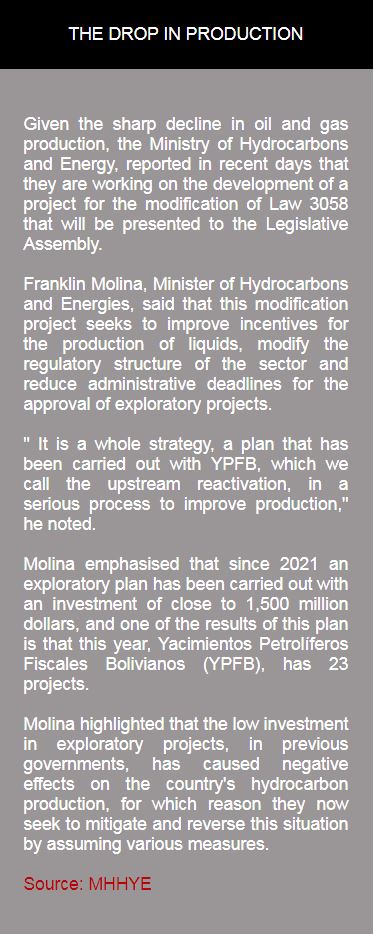Bolivia, a country traditionally linked to the production of fossil fuels such as natural gas, is facing a decline in its production curve that is making the economy and the energy transition itself more complex…
ISSUE 117 | 2023
Elizabeth Álvares Riva
The lack of development and sustainability in the hydrocarbons sector, highlighted mainly by a decrease in investment for exploration, during the 14 years of Evo Morales’ government, has caused a severe economic crisis that the country is now facing, according to researchers and professionals in the field.
The Hydrocarbons law 3058, and the resulting nationalisation, of May 2006, implemented a rentier and monopolistic policy in favour of the State that left aside forecasting and incentives for the exploration of new oil fields, said Juan Fernando Subirana, a graduate faculty member at UPSA University and Raúl Velásquez, an energy and hydrocarbons analyst at Fundación Jubilee, during their participation in Colloquium 117 organised by the magazine ENERGÍABolivia.
A STRONG CRISIS
Velásquez said that the hydrocarbons sector in Bolivia is going through a severe crisis, the worst in the last 20 years, and this would be demonstrated because of the low production of natural gas and liquid fuels, the depletion of producing fields, the reduction in export volumes and the growing imports of gasoline and diesel, requiring the State to spend large amounts of resources.
“The State, with the objective of cashing rents, has neglected and discouraged the participation of the private sector, the oil&gas companies, which should be the ones that promote the exploration and development of hydrocarbons,” he said.
On the other hand, according to Juan Fernando Subirana, the hydrocarbons policy that governs the country must be updated since it no longer corresponds to a context with high gas reserves as it was during the first years of the MAS government, when it could be thought ‘’generating good income to the country’’, without anticipating current times. “Now, what happens when there are no profits?” he asked, adding that this is where this model begins to show deficiencies, assuring that this is a consequence, mainly, of having relegated exploration and Foreign Direct Investment (FDI) in the country.
CHANGES IN THE LAW
Another aspect that is against the development of hydrocarbons is the subsidy model that the country has, since the national market is served with prices frozen for almost two decades, in an environment where the international market is experiencing strong price increases and Bolivia is losing the opportunity to export more and have higher economic income.
ECONOMIC MODEL
The two analysts consider that the MAS has not stopped supporting its government management in the extraction of natural resources and in the sale of raw materials without added value. In this framework, the attempt to implement a new economic model, based on the nationalisation of hydrocarbons in Bolivia, would have been unsuccessful.
When asked if the nationalisation of hydrocarbons was an important step in the reformulation of the State-foreign investment link and in the implementation of a new economic model in the country, Raúl Velázquez said that the change in the State-Private business relationship was effective, as a result of Law 3058, which is the one that establishes the concept of IDH (Direct tax to hydrocarbons production) and determines that the State keeps a 50% and the private entity keeps the other 50%.
He clarified, however, that as a result of the substitution of the Shared Risk Contracts by the Operation Contracts, in 2006 and later with the new Constitution, the State keeps almost 83% and private companies keep the rest of the income, an aspect that in his opinion would have limited new investments and discouraged exploration; causing the current situation of crisis and uncertainty that exists in the sector.
The attempt to implement a new economic model based on the nationalisation of hydrocarbons, cashing a higher income rent and the distribution of these resources through bonds for the most disadvantaged sectors and for the diversification of the productive sector has “failed”, in the sense that they continue betting on the extraction of natural resources, but without sustainability or a long or medium term plan.
Subirana considers that the hydrocarbons policy has allowed the rethinking of social policies, but without clear planning. “Long-term commitments have been defined with resources that were not guaranteed, so obviously there is a break, a turning point is generated, because a fiscal deficit appears, and that is the moment in which we have been for quite some time. Consequently, it is important to discuss and deepen the alternatives that could be faced”.
On the other hand, Raúl Velásquez said that a new economic development model has not been achieved, because the State and the generation of tax revenues continue to depend on the exploitation of natural resources that are sold as raw materials, without modifying old practices of economic models criticised by MAS itself.
“The Development Plan presented in July 2006 does not really propose a new economic model for the country. It is a plan based on three sectors that he identified as strategic: hydrocarbons, mining and electricity, which, at least in the first two, continues to be the same model that Bolivia has put forward practically since its birth, a bet on the extraction of natural, non-renewable resources, neglecting the sustainability of these sectors and their surpluses in the long term”, points out Raúl Velásquez.
The Government, together with all the players in the hydrocarbons sector, facing a crisis that affects the country’s economy, is obliged to direct changes in the Hydrocarbons Law to reverse the adverse factors that cause the lack of exploration of new fields and the low production of natural gas and oil.

“The problem is in the regulations, changes to the Law must be discussed and executed, as soon as possible. There are several options, including a temporary tax exemption if an exploration project is successful, in which case the tax payments could be lifted for five years to speed up the recovery of investments, on top of this, a change of contract models is also being considered,” said Subirana.
Another aspect that is considered urgent is the adjustment in the role of the state company Yacimientos Petrolíferos Fiscales Bolivianos (YPFB), which is not fulfilling its responsibility to participate and promote the development of hydrocarbons in the country.

“…it is impossible, at least for now, to stop the country’s dependency on natural gas for power generation…”
“Institutional roles should also be discussed, what is the role of YPFB? It has become a producer of jobs instead of a producer of hydrocarbons, that is something that must be changed, to recover its status as an operator, dedicated to exploring and exploiting hydrocarbons”, added Raúl Velásquez.
Subirana emphasised that the debate and modification of the Hydrocarbons Law is urgent to reactivate gas production and satisfy the domestic market, as well as honouring export commitments that the country has with Brazil and Argentina, which are becoming more and more challenging.
“When the relationship model between the State and the operating companies was defined, almost 18 years ago, the domestic market demand was 2 million cubic metres/day, today it is 13 and even 15 million cubic metres per day, we are tremendously dependent on natural gas. It is a sector that we must take care of, from internal consumption, because the reduction in terms of production is leaving us more and more outside the export market”, he said.
Both professionals agree that the problem is structural and that its roots lie in Law 3058, which was born as a result of political and social turmoil during ‘’The Gas War (2003)’’ and the subsequent referendum on hydrocarbons (2004). The same norm that was “empowered” with Decree 28701, which was related to the Nationalisation of Hydrocarbons in May 2006, which led to the migration of contracts and the increase of the State’s participation in oil & gas income up to 82%, leaving private companies with only 18%, thus discouraging companies that had to assume risks on their investments.
“From the Gas War to the Political Constitution update of the State during 2009, the sustainability of the sector is not on debated, the debate is centralised in the income management and the role of the State in the hydrocarbon activity,” said Velázquez, highlighting the implementation of the narrative “gasifying the economy”, coupled with the discourse of “gas for Bolivians”, based on the assumption that the country had enormous reserves of this energy, without taking into account the risks that this entails as a non-renewable resource, where all expectations were placed on natural gas, making the sustainability of the hydrocarbon sector even more complex in medium and long term, according to Velásquez.

ENERGY TRANSITION
Although Bolivia has an important infrastructure for electricity generation and a GDP surplus registered after a long time in the country, they observed that this generation, by depending exclusively on natural gas, has become more complex due to the decline in reserves, once again inducing failures at a planning level in the sector.
They hinted that although from a financial point of view the export of electricity to Argentina is highly rational because added value is being given to natural gas, they pointed out that this electricity is generated from natural gas that is sold to thermoelectric plants in the country at a subsidised price, a benefit that was restricted to the industrial sector, thus making it less competitive, considering that now they are not allowed to consume natural gas for self-generation of electric energy using their own power generators, a reality that could have repercussions in an inflationary process at a national level, a situation that for some analysts is already in full process.
For Velázquez “…it is impossible at least for now, to stop the country’s dependency on natural gas for power generation. Bolivia has a dual dependency on natural gas, on the one hand, there is the generation of fiscal resources such as royalties and IDH, as well as international reserves with exports, and on the other hand, it also has a huge internal dependency for power generation.”
In this context, he said that the transition towards renewable energies is also becoming complex, especially because at a global level their intermittency has not yet been resolved and because the adoption of new technologies for their implementation in Bolivia continues to be insufficient to cover all the demand of the energy matrix, on top of the high cost of these new generation technologies that makes the transition more expensive.
Under these circumstances, the panorama exposed by both analysts offers a highly complex panorama of the sector, highlighting situations of lack of predictability in its planning and regulations that would have slowed down even more investment processes in hydrocarbon exploration, which are also highly questioned due to their role in global warming processes.

…the transition towards renewable energies is also becoming complex, especially since their intermittency has not yet been resolved at a global level…”
